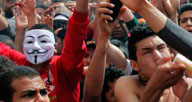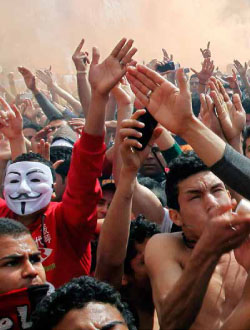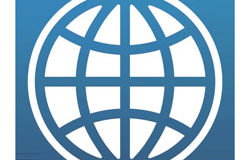What Role for the World Cup in Arab Spring?

 Less than a year from Brazil 2014, in Egypt and Turkey alike, the stadiums give the pulse of the protests and the people
Less than a year from Brazil 2014, in Egypt and Turkey alike, the stadiums give the pulse of the protests and the people
A soccer brawl last year, in which more than 70 militant soccer fans died, galvanized significant numbers of Egyptians against the military and security forces. The brawl accelerated the military’s desire to turn power over to an elected government.
Eighteen months later, mass protests, involving Muslim Brothers, non-Brothers and street battle-hardened soccer fans took place to oppose the military ouster of elected president Mohamed Morsi and the subsequent brutal crackdown on the Brotherhood. Both the coup and the crackdown were backed by a significant segment of Egyptian society.
The resistance to military rule and the security forces by many soccer fans and the youth groups that formed the backbone of the popular uprising that forced Hosni Mubarak out of office in early 2011 is again visible. Today, this is a resistance that has been adopted by a far wider part of the Egyptian public, and indeed reinforced by what many Egyptians perceive to be a restoration of some of the repressive features of the Mubarak era. In other words, even if Morsi had succeeded in becoming widely reviled after only a year in office, the return of the capricious security force brutality that was one of the main drivers of Mubarak’s removal has the soccer ultras exercised. This has been evident in various forms of violent pro-Morsi protests inside and outside of Egypt’s soccer stadiums.
The impact of soccer fans is, of course, not exclusive to Arab autocracies. It is also felt in the region’s illiberal democracies – the possible direction of Turkey, for instance. Egyptian strongman General Abdel Fattah Al Sisi and Turkish Prime Minister Recep Tayyip Erdogan see their critics in the same terms – as terrorists who need to be harshly subdued. Soccer fans rank high on both their agendas.
Both Egypt and Turkey remain deeply polarized. Public opinion is fluid. Backing in Egypt for the coup against Morsi is fragile and conditional. Cracks in that support have manifested themselves despite a significant number of Egyptians egging on the military and the security forces to be even tougher in their crackdown on the Brotherhood.
By the same token, Egypt’s deep polarization has not left the militant soccer fans untouched. The crisis in Egyptian soccer was famously amplified by last year’s deadly brawl in Port Said. And while the ultras as organizations have refrained from joining the fray, many of their members and leaders have, reflecting the gamut of political views in their ranks. For instance, in a twist of irony, many Ultras White Knights (UWK) joined the pro-Morsi protests. The UWK is a fan group of storied Cairo club Al Zamalek SC, which traces its roots to support of the monarchy that was toppled by the military coup in 1952 and replaced by Arab nationalist leader Gamal Abdel Nasser. Nasser became the club’s president and brutally repressed the Brotherhood.
The arch rivals of the UWK, Ultras Ahlawy, the fan group of Al Ahly SC – historically the nationalist club – issued their first anti-Brotherhood statement in more than a year weeks into the current crackdown. The statement ended the group’s silence in respect of the government while Morsi was in office. By refraining from attacking the government, Ahlawy had hoped that harsh verdicts would be served in the trial of those responsible for the deaths in Port Said. Ahlawy got only partial satisfaction: while 21 supporters of Port Said’s Al Masry SC were sentenced to death, seven of the nine security officials were acquitted.
“The ultras have become fascists. Like Egypt, they have collapsed. They have no values and no real beliefs,” said one former ultras leader, who left his group in protest at the political turn that it had taken. In a perverse way, the difficulty of Egyptian and Turkish ultras in defining themselves is not dissimilar to that of the Brotherhood. The Brotherhood has yet to make up its mind as to whether it is a social or a political movement. That decision may become easier if it survives the crackdown and emerges strong enough one day to negotiate the terms of a political solution to Egypt’s crisis – a prospect that, to be sure, appears increasingly unlikely.
The Egyptian and Turkish ultras, for their part, refuse to acknowledge that they are as much about politics as they are about soccer. Their battle in Egypt for freedom in the stadiums and their prominent role in the toppling of Mubarak, as well as their opposition to the military rulers that succeeded him and the Morsi government, made them political by definition. Those who populated their rank and file were united in their support for their club and their deep-seated animosity toward the security forces. Alas, they were united on little else.
The ultras’ fate could change if Egypt continues down the road on which it has embarked – that of a restoration of Mubarak’s police state. Repression with little more than a democratic façade could again turn stadiums into political battlefields. The former ultra again: “I’m afraid of the return of the military state. That is not what I fought for in the stadiums and on Tahrir Square. I’m also afraid of the Brotherhood. It’s a choice between two evils. If you ask me now, I’d opt for the military, but that could well change once this is all over.”
The Turkish ultras have one leg up on their Egyptian counterparts. Carsi, the support group of Istanbul’s Besiktas JK, with a massive following across the country, traces its roots to the far left and positions itself as anarchist. Still, despite having wholeheartedly embraced massive anti-Erdogan protests last June in Istanbul’s Taksim Square, they, like the Egyptians, are responding to the backlash by insisting on their pro-forma apolitical nature – this after 20 of their numbers were charged with belonging to an illegal organization.
Neither the government nor the ultras have illusions. Both are preparing for confrontations this fall and into the new year – not in Taksim, but in the stadiums and the universities. The prospect of renewed protests has prompted the Erdogan government to announce measures that could have been taken from Al-Sisi’s playbook. They include replacing private security forces in stadiums and on campuses with police forces; banning the chanting of political slogans during soccer matches; requiring clubs to force spectators to sign a pledge to abide by the ban before attending a game; and cancelling scholarships for students who participate in anti-government protests.
To drive home the message that protest equals terrorism, a video issued by the Anti-Terrorism Office in Ankara warned that protests were the first step toward terrorism. The 55-second video featuring a young woman demonstrator-turned-suicide bomber warned the public that “our youth, who are the guarantors of our future, can start with small demonstrations of resistance that appear to be innocent, and after a short period of time, can engage without a blink in actions that may take the lives of dozens of innocent people.”
As in Egypt, Erdogan’s efforts to squash further protests are failing. Fans have been reminding the government that the battle is not over – and indeed may only have just begun – when they chant during the matches, demanding political resignations: “Everywhere Is Taksim Square! Everywhere Is Resistance!” It is a slogan that the Brotherhood has adopted as it has launched regular, smaller-scale protests across Cairo and the rest of Egypt – a tactical evolution meant to avoid the massive demonstrations that risk ending in a bloodbath.
James M. Dorsey is a senior fellow at the S. Rajaratnam School of International Studies, co-director of the University of Würzburg’s Institute for Fan Culture. He is the author of The Turbulent World of Middle East Soccer blog.











